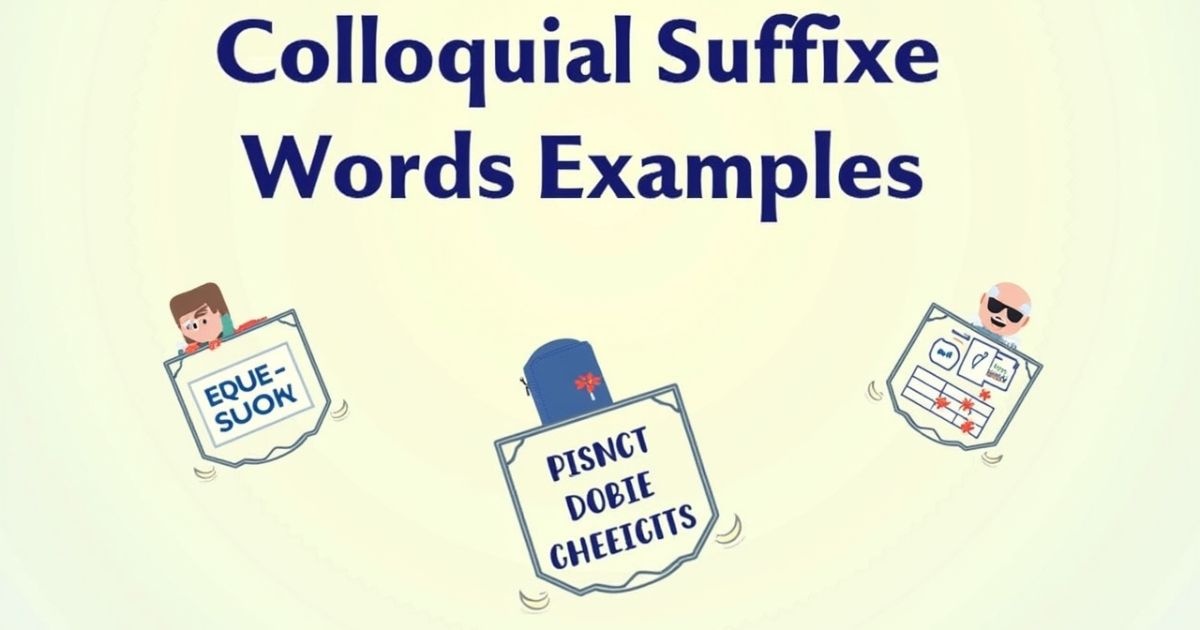Language is always changing. One way it grows is through suffixes, the little endings we add to words. In casual English, these suffixes make speech friendly, playful, and simple.
This guide is a colloquial suffixes in English easy examples & simple word formation guide. You’ll see how suffixes turn plain words into catchy ones. From cutie to brekkie, suffixes show how English stays alive in everyday talk.
Suffix Word List Table
| Suffix | Word | Colloquial Form |
|---|---|---|
| -ie/-y | dog | doggy |
| -ie/-y | breakfast | brekkie |
| -ie/-y | cute | cutie |
| -ie/-y | mum | mummy |
| -ie/-y | football | footy |
| -o | smoke break | smoko |
| -o | afternoon | arvo |
| -o | weird | weirdo |
| -er | joke | joker |
| -er | blog | blogger |
| -er | game | gamer |
| -s | hug | hugs |
| -s | mom | moms |
| -s | sandwich | subs |
| -s | chip | chips |
1. Understanding Colloquial Suffixes
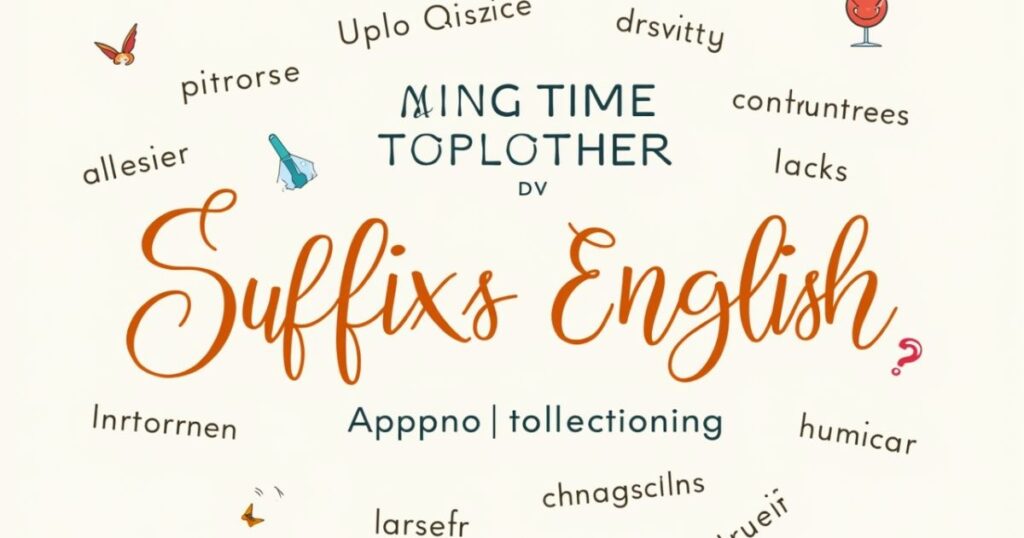
1.1 Definition and Key Characteristics
A suffix is a group of letters added at the end of a word. It changes the word’s form, sound, or meaning. Formal suffixes like -tion make academic words (education). Colloquial suffixes make casual, simple words like brekkie for breakfast.
Key features:
- They are playful.
- They shorten or soften words.
- They feel personal and friendly.
- They appear in speech, texting, and advertising.
Think of dog → doggy or Australia → Aussie. These are easy suffix examples anyone can understand.
1.2 How Colloquial Suffixes Work in Language
Colloquial suffixes work by softening or shortening words. Instead of saying “refrigerator,” people say fridgey. These endings make speech sound closer, like how friends talk.
A suffix words list shows that endings like -ie, -y, -o, -er, and -s create fun versions of words. They don’t just change spelling. They change the feeling too.
1.3 Why They Matter in Informal English
Suffixes matter because they make English flexible. People use them to connect, sound relaxed, or add humor. Think of how kids say doggy instead of dog. It shows warmth. Even adults use playful suffixes when joking or texting.
That’s why learning colloquial suffixes in English easy examples & simple word formation guide qui is so helpful.
2. The Most Common Colloquial Suffixes with Examples
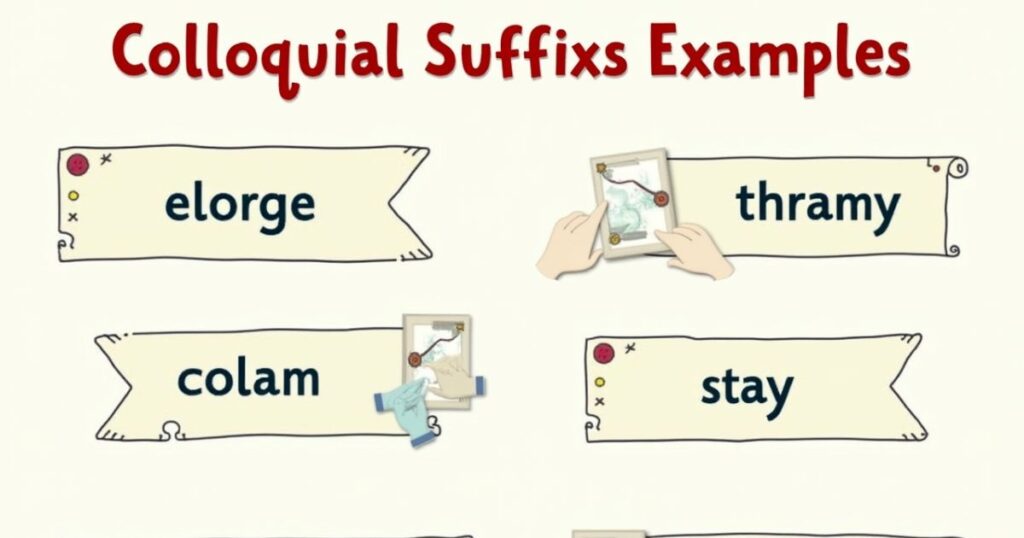
2.1 The “-ie / -y” Family (cutie, Aussie, brekkie)
This is the most popular colloquial suffix. It makes words sweet, short, and friendly.
Examples:
- Dog → doggy
- Cat → kitty
- Breakfast → brekkie
- Cute → cutie
- Mum → mummy
- Foot → footy (football)
- Australia → Aussie
- Biscuit → bikkie
This family appears in almost every suffix words list because it is global.
2.2 The “-o” Suffix (smoko, arvo, weirdo)
Common in Australian slang. It shortens words and adds character.
Examples:
- Afternoon → arvo
- Smoke break → smoko
- Weird → weirdo
- Comrade → comrado (old slang)
- Pregnant → prego
It makes words sound relaxed and direct.
2.3 The “-er” Suffix in Informal Speech (runner, joker)
The -er suffix can be formal or informal. In casual speech, it adds identity.
Examples:
- Joke → joker
- Blog → blogger
- Dance → dancer
- Sing → singer
- Teach → teacher
- Game → gamer
In slang, it often marks personality (joker, stoner, sleeper).
2.4 The “-s” Diminutive (hugs, moms, subs)
The -s ending adds warmth or plurality. It is also common in advertising.
Examples:
- Hug → hugs
- Mom → moms
- Sandwich → subs
- Chip → chips
- Bud → buds
Brands use it because it’s short and catchy (Subs Deal, Moms Club).
2.5 Regional and Cultural Variations in Usage
- British English: footie, laddie, bikkie.
- American English: subs, burgers, gamer.
- Australian English: arvo, smoko, brekkie.
- Thai learners ask: suffix มีอะไรบ้าง (what suffixes exist?).
Each culture uses suffixes in its own way.
Also read: 100+ Tuesday Blessings Images to Fill Your Morning with Faith, Peace & Joy
3. Colloquial Suffixes in the Modern Digital Age
3.1 Internet & Social Media Origins (memes, handles, trends)
Online life creates new suffixes. Words like selfie, emoji, and techie spread fast. Social media shortens words to make them catchy. This is a clear colloquial suffixes in English easy examples & simple word formation guide in action.
3.2 Generational Differences in Suffix Usage
Teens and Gen Z create new slang with suffixes. They say bestie for best friend, or foodie for food lover. Older generations may stick with simpler forms. These differences show how suffixes evolve with age groups.
3.3 Branding, Marketing, and Creative Wordplay
Companies use suffixes to make brands sound friendly. Think of Spotify, Yummly, Bitmoji. Adding -y, -ify, -oji makes names catchy. Marketing teams know that suffixes make words easier to remember.
4. Rules and Patterns for Word Formation
4.1 Phonetic Considerations and Sound Shifts
Suffixes often make words shorter and smoother. For example: Australian → Aussie. The sound is simple and clear. That’s why suffixes are common in casual speech.
4.2 Grammar Rules and Usage in Context
Suffixes follow grammar rules. The -er suffix usually makes nouns for people (teacher, singer, blogger). The -ie/-y endings create softer forms (doggy, sweetie). Understanding these rules helps learners use suffixes correctly.
4.3 Tips for Using Colloquial Suffixes Naturally
- Use them in casual speech, not formal writing.
- Start with common ones like -ie, -y, -er.
- Read a suffix words list for practice.
- Try exercises with 10 examples of suffixes used in a sentence.
5. Regional and Cultural Examples
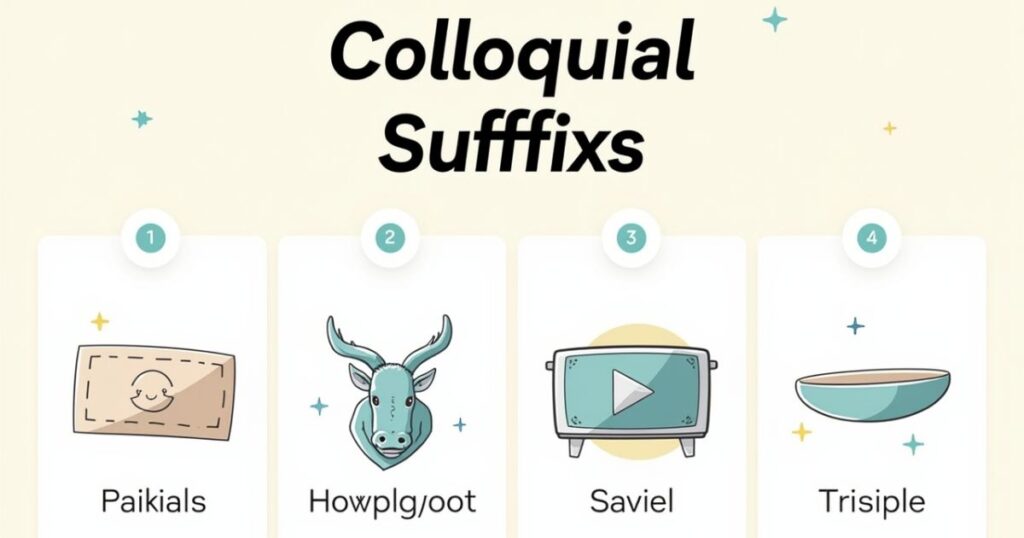
5.1 British English Colloquial Suffixes
- Laddie (boy)
- Footie (football)
- Bikkie (biscuit)
- Telly (television)
5.2 American English Informal Patterns
- Burgers
- Subs
- Gamer
- Joker
- Worker
5.3 International and Global Variations
- Thai: suffix มีอะไรบ้าง
- Filipino slang uses -ers endings.
- Indian English mixes -ji with suffixes (respect form).
6. Common Mistakes and Misconceptions
6.1 Overusing Colloquial Suffixes in Formal Writing
Adding too many suffixes in essays or reports can look unprofessional. Don’t say brekkie in a school exam.
6.2 Cultural Sensitivity and Appropriateness
Some suffixes may sound friendly in one culture but odd in another. Always check usage before copying slang.
6.3 Pronunciation and Stress Pattern Errors
Learners often stress the wrong syllable. For example, cutie is cue-tee, not coo-tie. Listening to natives helps avoid mistakes.
7. Fun and Practical Applications
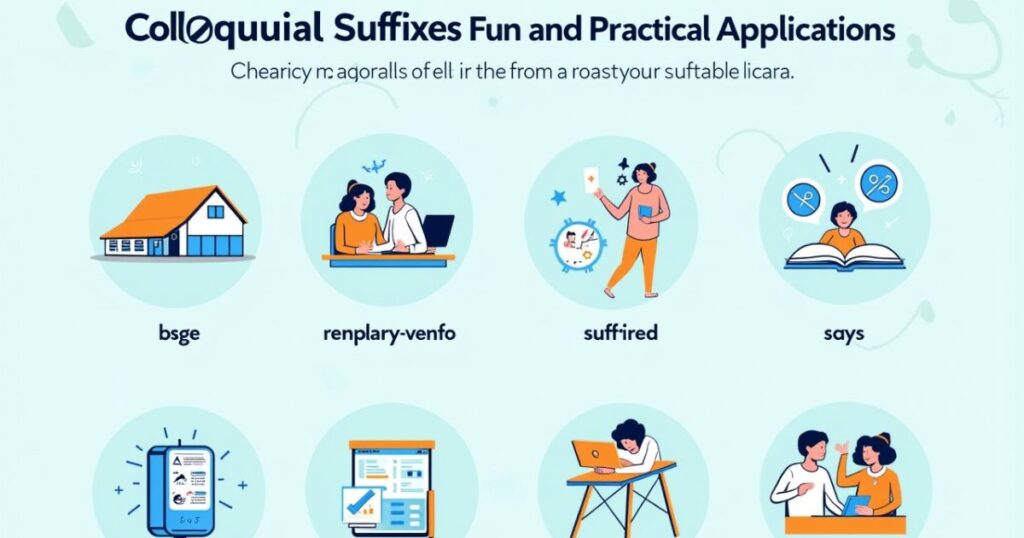
7.1 Exercises for English Learners
Try making 5 examples of suffixes sentences like:
- She gave me hugs.
- He is a joker.
- We ate subs.
- My doggy is cute.
- We had brekkie.
7.2 Creative Play for Native Speakers
Native speakers invent words:
- Snackie (snack)
- Chiller (relax person)
- Bestie (best friend)
- Workie (work project)
7.3 Interactive Examples & Word Transformations
Take simple words and add endings:
- Snack → snackie
- Chill → chiller
- Friend → bestie
- Work → worker
- Smoke → smoko
This practice builds skill in suffix use.
8. Evolution and Future Trends
8.1 Historical Development of Colloquial Suffixes
Colloquial suffixes go back centuries. Words like doggy and sweetie appear in old English texts. Over time, they became standard in casual speech.
8.2 Influence of Social Media & Pop Culture
Social media made words like selfie, foodie, bestie global. Pop culture adds playful suffixes daily. Songs, memes, and hashtags push them forward.
8.3 Predictions for Future Word Formations
Future suffixes may come from technology and AI. New forms like botty (chatbot) or streamie (streamer) may appear. English will keep growing with creative endings.
Conclusion: The Power of Informal Word Formation
Colloquial suffixes keep English alive, friendly, and fun. They turn long words into simple forms. They add warmth, humor, and connection. From cutie to selfie, suffixes shape how we talk every day.
This colloquial suffixes in English easy examples & simple word formation guide shows their power. Learn them, use them wisely, and watch how language becomes more colorful. English stays strong because it never stops changing.
